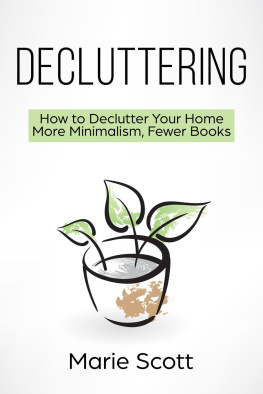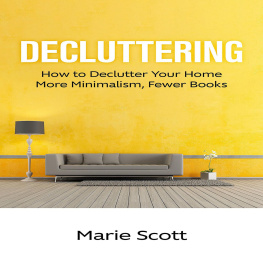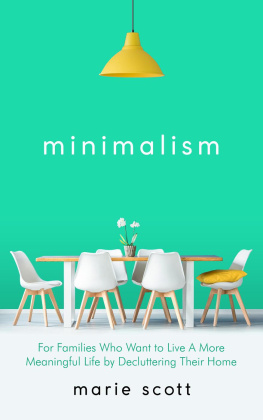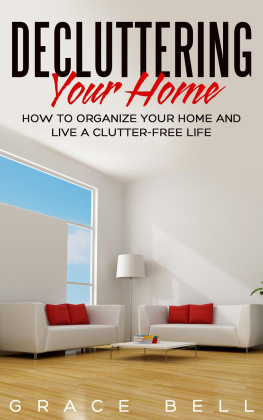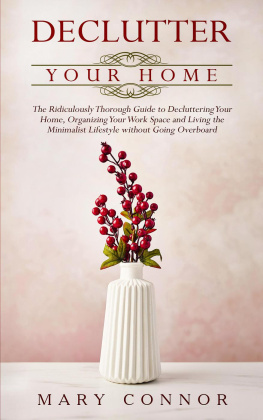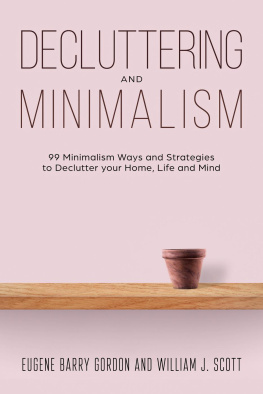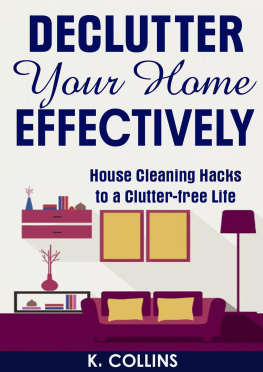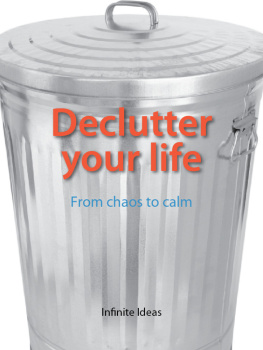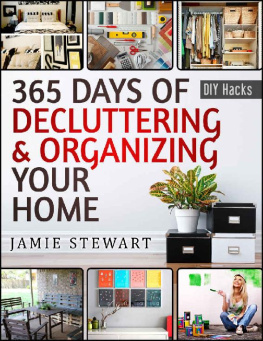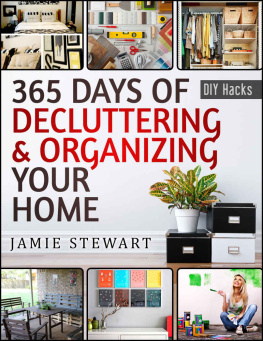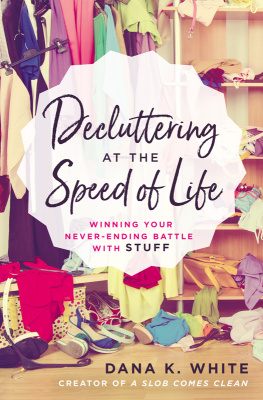Decluttering:
How to Declutter Your Home
More Minimalism, Fewer Books
By: Marie Scott
While every precaution has been taken in the preparation of this book, the publisher assumes no responsibility for errors or omissions, or for damages resulting from the use of the information contained herein.
DECLUTTERING
First edition. December 5, 2018.
Copyright 2018 Marie Scott.
ISBN: 978-1386042587
Written by Marie Scott.
10 9 8 7 6 5 4 3 2 1
TABLE OF CONTENTS
INTRODUCTION
CHAPTER 1: WHY WE DO IT TO OURSELVES
A recent phenomenon
So, why?
CHAPTER 2: BOOKS AND KEEPSAKES
Joy and purpose
Divide and conquer
Choosing wisely
Where to get rid of books
Dividing and conquering keepsakes
Digitize your memories
Sorting memory from clutter
Is it worth donating?
CHAPTER 3: AN EMBARASSMENT OF CLOTHING, LINENS AND TOOLS
Why we love clothes
What to get rid of now
The rest of it
Your new closet
For folded clothes
Your new habits
Linens
What do you need?
Tools
Cleaning it up
CHAPTER 4: KITCHEN CHAOS NO MORE
How messy is it?
Get your counters under control
Kill cupboard disorder
China, cutlery, cups and glasses
What do you need?
Small appliances
Tupperware
The fridge
A communal space
Old magazines and newspapers
Anything broken?
The overstuffed living room
Stuff that doesnt belong there
CHAPTER 6: THE HORROR. THE BATHROOM
Shampoos and conditioners
Hotel grooming products
The rest of it
Medicine cabinet
CHAPTER 7: THE HALLWAY NOT A DUMPING GROUND
Ground rules
Footwear
School backpacks and shopping bags
Outerwear
In transit items
CHAPTER 8: A PLACE OF REST
Ive been looking for that!
The dresser
The bed
Clean it up
CHAPTER 9: GETTING THE TEAM ON BOARD
Follow the leader
The reluctant spouse
Make your spouse your ally
Decluttering Progress Board
The Decluttering Challenge
Getting teens on board
CHAPTER 10: KEEPING IT REAL (AND CLUTTER-FREE)
Garage sales and secondhand stores
One in, one out
Donations
Tidy as a lifestyle
Decluttering days
Reward yourself
Life is for living
CHAPTER 11: OTHER AREAS TO CLEAN UP
Your schedule
Declutter your budget
Better uses for time and money
Declutter your friendships
Toxic friends
Energy leeches
Decluttering your electronics
CHAPTER 12: SCIENCE SAYS, TAKE A BOW!
Chaos is destructive
Chaos is distracting
Chaos robs you of sleep
Chaos makes you cranky
CONCLUSION
W hether you live in a house, a condominium or a sprawling estate, youve got stuff.
Lots of stuff.
Stuff creeps into your domicile, almost magically appearing and then disappearing. Sometimes it appears years later. And sometimes, like the mythical sock that gets lost in the dryer, it is never again seen.
And the longer we stay wherever it is we live, the more stuff we seem to accumulate. Sometimes the process is gradual. Like many people, we continually vow that well change our stuff-accumulating ways.
This pledge usually coincides with a move.
And we usually keep our pledge until were again tempted by more stuff:
That sad-eyed velvet clown painting at the garage sale.
The electric drill to replace the one, which has disappeared (but which is really in the basement just not in the toolbox).
Those fabulous shoes in that super special color that will perfectly match that dress.
And all that conserved tinfoil, wrapping paper and bubble wrap youre going to use one day sits in a drawer or cupboard. But, like the ball of rubber bands, its most likely you will never do any such thing.
But its stuff and its yours - even that pair of shorts with the hole in the butt.
The things we accumulate and fill our homes with may have no reason to be there. But accumulating things we dont need is not rational. Theres something else at work there like the underlying sense of security being surrounded by stuff gives us. This is the reason people experiencing homelessness travel with often nonsensical items, like broken radios. Its their stuff.
But youre not experiencing homelessness. You live in a home with too much stuff in it and you know youre doing this thing the wrong way. If youre ready to do it right, then youve come to the right place. This book is about decluttering or more specifically how to declutter your home more Minimalism, fewer books.
Less stuff. Yes. We have included books because youre probably not going to read them again. Well, maybe a few but were not talking about those. In this book, youre going to learn some solid tips for decluttering your home, based on solid advice and experience on getting to where you need to go. Lets not waste any more time. Lets get decluttering!
CHAPTER 1: WHY WE DO IT TO OURSELVES
I hinted at this the introduction you just read. When we settle, we begin to fill our homes with all manner of stuff. Its easy to explain the phenomenon away by saying its a consequence of consumer society. While that may be partially true, this reasoning does nothing to explain the emotions we attach to our stuff.
Ive seen some very interesting examples of the accumulation of what amounts to clutter. In one instance, I found a stash of half-used jars of Vaseline. There must have been a dozen of them in that dark corner of my aunts bedroom. I was a kid, so I didnt mind asking her about the weird find. She told me it was for her feet. She didnt tell me why she never finished a jar before starting another one, or why she had repeated this act of oddness on what appeared to be about a dozen occasions.
But thats only one of the weird, inexplicable examples of stuff accumulation. Collectors have a genuine problem with stuff accumulation, being physically unable to pass a secondhand or curio store without having convulsions. The promise of a stray vintage button is just too enticing and it would go so well with the other thousand at home, right?
A recent phenomenon
The Industrial Revolution is where Id be willing to bet the genesis of having way too much stuff began. With this historic turning point came a new prosperity and that meant people had disposable income. Some call it play money or mad money. Honey, moneys money. Its an asset. You worked hard to make it. Why on Earth would you blow it on junk? But a lot of people do.
While the phrase disposable income may rankle some (me, for one), disposable income is what people began to have, as the Industrial Revolution attracted people to urban centers and away from an agrarian lifestyle and subsistence living. For once, there was money in their pockets after the rent, food, clothing and other necessaries were paid for. Suddenly, people had money to spend on decorative items, more clothing, things for the kitchen and other items. The homes of Western Civilization began to fill with stuff.
Next page
